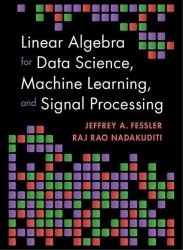 Название: Linear Algebra for Data Science, Machine Learning, and Signal Processing Название: Linear Algebra for Data Science, Machine Learning, and Signal Processing
Автор: Jeff Fessler, Raj Rao Nadakuditi
Издательство: Cambridge University Press
Год: 2024
Страниц: 451
Язык: английский
Формат: pdf
Размер: 29.2 MB
Maximise student engagement and understanding of matrix methods in data-driven applications with this modern teaching package. Students are introduced to matrices in two preliminary chapters, before progressing to advanced topics such as the nuclear norm, proximal operators and convex optimization. Highlighted applications include low-rank approximation, matrix completion, subspace learning, logistic regression for binary classification, robust PCA, dimensionality reduction and Procrustes problems. Extensively classroom-tested, the book includes over 200 multiple-choice questions suitable for in-class interactive learning or quizzes, as well as homework exercises (with solutions available for instructors). It encourages active learning with engaging 'explore' questions, with answers at the back of each chapter, and Julia code examples to demonstrate how the mathematics is actually used in practice. A suite of computational notebooks offers a hands-on learning experience for students. This is a perfect textbook for upper-level undergraduates and first-year graduate students who have taken a prior course in linear algebra basics.
Nearly every mathematical concept in this book has corresponding operations in software, and this book describes those operations using the Julia language. This relatively new language has many benefits. Julia is designed in a way that allows the code to look very similar to the math, facilitating the translation of algorithm ideas to working software. Julia uses dynamic typing so it is suitable for interactive and educational use, yet it is very fast because it is compiled. Julia is open source and its git-based package manager greatly facilitates reproducible research. Readers do need to know Julia to begin using this book; the language borrows a lot of ideas from MATLAB and Python (among others), so readers familiar with those tools will be able to follow the examples easily. Readers can view the Julia code examples as pseudocode even if they prefer to use other languages, learning some Julia along the way. There are many tutorials online as well as other books based on Julia that provide useful references. Every figure in this book was generated using Julia.
“This is an excellent and timely text that addresses the specific needs of Data Science (DS), Machine Learning (ML), and signal processing (SP). Its nicely crafted coverage is designed to prepare students in the areas of DS/ML/SP, in particular, by drawing thoughtful examples from these fields. With increasing demands from data-based sciences, there is a pressing need for a book in ‘the new linear algebra,’ and this text fills this gap.” - Yousef Saad, University of Minnesota
“With the emergence of Graphics Processing Units (GPUs), the importance of linear algebra for Machine Learning cannot be overstated. This is a thoughtful and timely work on the topic of linear algebra for Machine Learning, which I anticipate will be one of the definitive textbooks in this field.” - Vahid Tarokh, Duke University
Скачать Linear Algebra for Data Science, Machine Learning, and Signal Processing
|